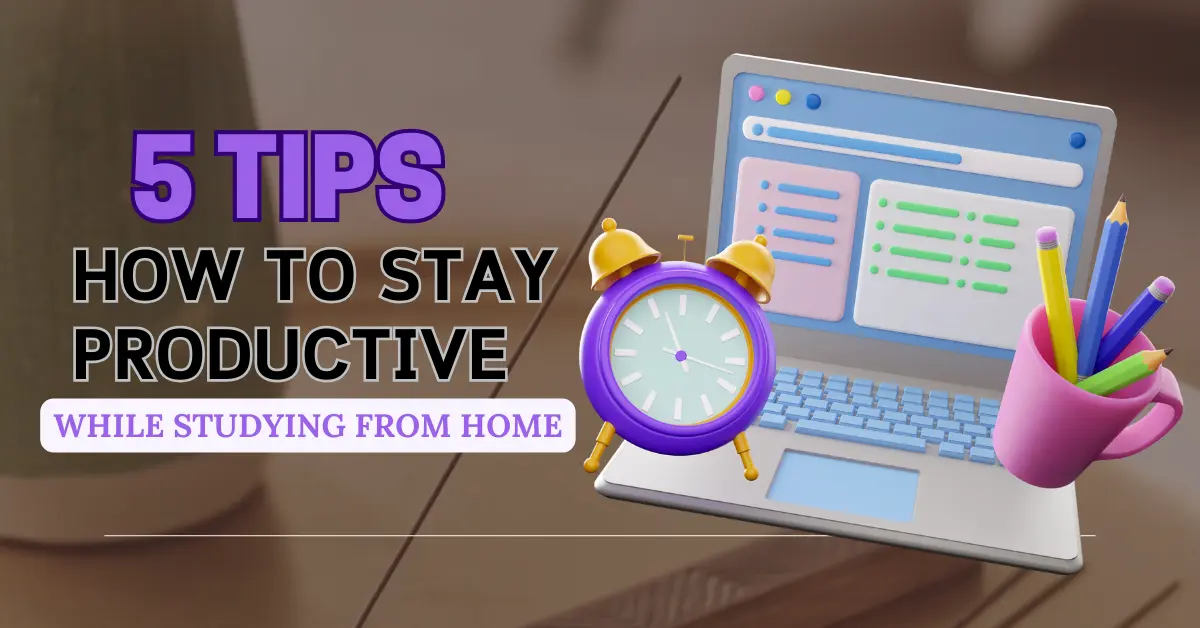
How to Stay Productive While Studying from Home: 5 Tips
- 96
- 0
- 0
Staying productive while studying from home is crucial for several reasons. First, it helps you manage your time effectively, allowing you to complete tasks without distractions. Second, a productive environment boosts your focus and retention of information, making learning more efficient. Additionally, maintaining a routine can reduce stress and prevent procrastination, helping you stay motivated. Finally, being productive at home prepares you for future challenges in both academics and professional life. Overall, staying focused while studying ensures you achieve your goals and make the most of your education.
How to Stay Productive While Studying from Home
Studying from home has become a common reality for many students. While it offers comfort and flexibility, it can also bring challenges like distractions and lack of structure. Here are 5 practical tips for how to stay productive while studying from home.
Create a Dedicated Study Space

Your study environment plays a huge role in how well you can focus. You don’t need a separate room – even a small corner can work! Here’s how to set up your analysis area:
- Pick a quiet spot away from your bed (avoid studying in bed as it can make you sleepy)
- Make certain you have good lighting, preferably natural light
- Keep your desk clean and organized
- Have all your study materials within reach
- Use a comfy chair that helps with good posture
- Remove distracting items like your phone or gaming devices
Remember: Your brain will start linking this space with studying, making it easier to focus whenever you sit there.
Follow a Daily Schedule

Working without structure can lead to wasted time and poor productivity. Create a schedule that works for you:
- Wake up at the same time every day
- Plan specific study hours (try to match your most alert times)
- Include short breaks (we’ll talk more about this later)
- Set clear start and end times for your study sessions
- Plan your meals and snacks
- Include some exercise time
Pro tip: Write down your schedule and stick it where you can see it. You can use a simple notebook or your phone’s calendar app.
Here’s a sample schedule:
- 7:00 AM – Awake up and get prepared
- 8:00 AM – Start studying
- 9:30 AM – 15-minute break
- 9:45 AM – Resume studying
- 11:00 AM – Exercise break
- Noon – Lunch
- 1:00 PM – Study session
- 2:30 PM – Short break
- 2:45 PM – Final study session
- 4:00 PM – Wrap up and review
Use the Power of Breaks

Taking breaks isn’t being lazy – it’s key to staying productive! Your brain needs rest to process information and stay focused. Here’s how to use breaks effectively:
- Take a 10-15 minute break every hour
- Use the 52/17 rule: Study for 52 minutes, break for 17 minutes
During breaks:
- Step away from your study space
- Move your body (stretch, walk, or do quick exercises)
- Get some fresh air if possible
- Drink water and have healthy snacks
- Avoid starting activities that might run too long (like watching TV)
Important: Set a timer for your breaks to avoid getting carried away!
Manage Digital Distractions

Let’s face it – phones, social media, and endless notifications can eat up hours of our study time. Here’s how to take control:
- Turn off information on your phone and computer
- Use website blockers during study time (like Cold Turkey or Forest)
- Keep your phone in another room while studying
- Only check emails and messages during breaks
- Close all unnecessary browser tabs
- Use apps in “focus mode” if available
If you need to use your computer for studying:
- Use specific browsers or profiles for studying vs personal use
- Bookmark only study-related websites
- Log out of social media accounts
- Download study materials beforehand to avoid going online
Take Care of Your Physical and Mental Health

Good studying isn’t just about hitting the books – it’s about taking care of yourself too. Here’s what you must to focus on:
Physical Health:
- Get 7-9 hours of sleep each night
- Eat regular, healthy meals
- Stay hydrated (keep a water bottle at your desk)
- Exercise for at least 30 minutes daily
- Take screen breaks to rest your eyes
- Sit with good posture
Mental Health:
- Start each day with a positive mindset
- Set realistic goals
- Celebrate small wins
- Talk to friends or family when you feel stuck
- Don’t be too tough on yourself if you have an off day
- Try simple breathing exercises when stressed
Extra Tips for Success
Study Techniques:
- Break big topics into smaller chunks
- Use active recall (test yourself instead of just reading)
- Teach concepts to others (even if it’s just explaining to yourself)
- Make simple notes in your own words
- Use colors and diagrams to make information stick
Stay Connected:
- Join online study groups
- Share your goals with family or friends
- Find a study buddy for virtual study sessions
- Ask for help when you need it
Track Your Progress:
- Keep a simple study journal
- Note what works and what doesn’t
- Adjust your routine as needed
- Take photos of your completed work
- Use a habit tracker app or notebook
Remember that everyone is different, and what works for others might not work for you. Try these tips and adjust them to fit your style. The key is to keep trying until you find your groove. Final Thoughts: Building good study habits takes time. Don’t expect perfect productivity right away. Start with small changes, be patient with yourself, and keep adjusting your routine until it feels right. The goal isn’t to study for the longest time possible but to make the most of the time you spend studying.
With these tips and a positive attitude, you can create a productive study routine at home. Start small, stay consistent, and watch your productivity grow.
FAQ
What is the best way to create a study space at home?
Choose a quiet area with good lighting and minimal distractions. Use a comfortable chair and desk, and keep your study materials organized to help you focus better on your tasks.
How can I manage my time effectively while studying?
Use a planner or digital tools to create a study schedule. Break your study sessions into smaller chunks with breaks in between to keep your mind fresh and avoid burnout.
What should I do if I get distracted while studying?
Identify your distractions and minimize them. Put your phone on silent, use website blockers, and consider using headphones to create a focused atmosphere that helps you concentrate on your studies.
How can I stay motivated to study at home?
Set clear goals for each study session. Reward yourself after completing tasks, and surround yourself with positive influences, such as friends or family who encourage you to stay focused on your studies.
Is it important to take breaks while studying?
Yes, taking breaks is essential for maintaining productivity. Short breaks help refresh your mind and prevent fatigue, allowing you to return to your studies with renewed energy and focus.
Also Read:
How to Stay Productive at Work Or School
References:
https://www.tandfonline.com/doi/full/10.1080/03098265.2022.2087214
https://www.sydney.edu.au/students/time-management/productive-study.html
Disclaimer: The tips provided in this blog on how to stay productive while studying from home are for informational purposes only and should not be considered professional advice. Individual experiences may vary, and it is recommended to seek personalized guidance if needed.
Related post

7 Health Benefits of Assam Tea


